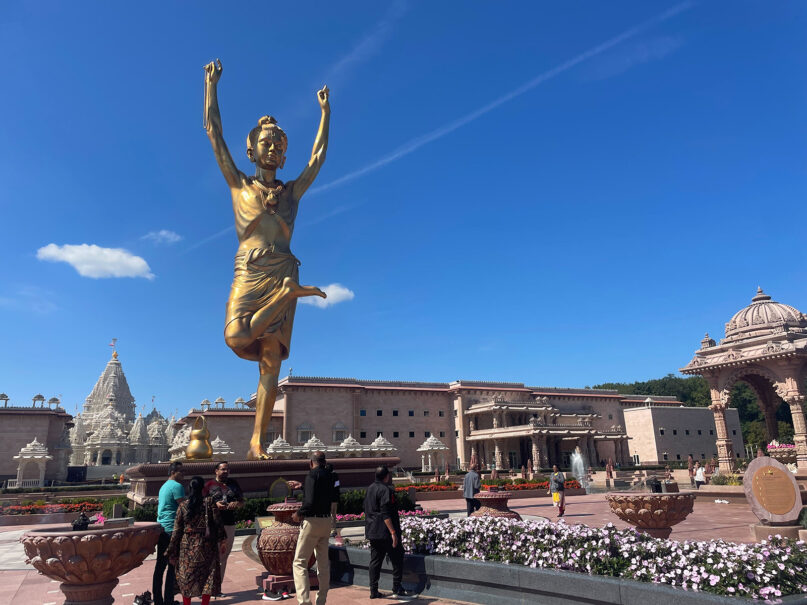(RNS) — Federal authorities, led by the U.S. Department of Justice, have ended a four-year-long investigation into alleged human rights violations in the construction of the largest Hindu temple in the United States — an extensive probe that spanned two presidential administrations. No charges were brought against BAPS, the Hindu denomination accused of alleged human trafficking and forced labor in the building of the temple. But while the federal probe is closed, years of intense media scrutiny following a very public raid on the temple grounds leave critical questions about government overreach when targeting minority faiths.
In the predawn hours of May 11, 2021, 200 or more federal agents from various entities including the FBI stormed what was then a construction site in Robbinsville, New Jersey. The area’s congressman, U.S. Rep. Jeff Van Drew, described the raid as “an aggressive show of force,” with agents “(holding) guns to the faces of swamis — holy men devoted to peace, nonviolence, and prayer; yet they were treated like dangerous criminals.”
The federal investigation into BAPS appears to have been coordinated with law firms that had filed a civil lawsuit in New Jersey on behalf of some who had worked at the temple, alleging low wages and caste-based discrimination. But the accusations struck anyone familiar with BAPS’ basic tenets as odd: Bhagwan Swaminarayan, who founded BAPS (the Bochasanwasi Akshar Purushottam Swaminarayan Sanstha), firmly rejected caste hierarchy, pointing to a principle codified in a central Hindu Scripture stating that “no one is superior and no one is inferior by birth.”
This principle is reflected in the organization’s history, which includes the veneration of leaders from marginalized castes such as the 19th-century guru Bhagatji Maharaj, and in its policy of conducting monastic ordination and congregational governance without regard to caste.
In addition, as in many Hindu traditions, BAPS members consider the building of temples an act of devotion, a means to connect with God through spiritual service. This was reflected in their presence in the United States thanks to R-1 visas, which specifically allow non-immigrant individuals to enter the U.S. to perform volunteer services. As BAPS’ lawyer Paul Fishman noted in a court filing after the raid, federal officials had long authorized the denomination’s use of R-1 visas, and for two decades, federal, state and local government agencies had regularly inspected all of BAPS’ construction projects.
In a telling turn of events, on July 13, 2023, 12 of the 21 plaintiffs in the civil lawsuit withdrew, telling authorities through their attorney that “they have never experienced any pressure, any casteism or discrimination at BAPS temples.” Lawyers, they said, had “convinced them to make false allegations in court, tempting them with promises of American citizenship for them and their families, and huge amounts of money.”

FILE – A 49-foot statue of Nilkanth Varni greets visitors to the BAPS Akshardham campus in Robbinsville, N.J., Sept. 20, 2023. (RNS photo/Richa Karmarkar)
Mostly artisans who had come to work on stone and wood carvings, they said that they saw themselves as religious volunteers serving “of their own accord,” and that they were “treated with love and respect.”
While the government investigated, construction work on Akshardham continued. More than 12,000 volunteers of diverse backgrounds from across the United States spent years completing the Hindu place of worship. Their efforts culminated in the inauguration of the BAPS Akshardham temple in October 2023. It has since become an important place of worship, with more than 2 million pilgrims and visitors coming to celebrate festivals, perform devotional rituals and seek solace.
But the aftershocks of the raid and the investigation have not ended. Hindu Americans living in northern New Jersey say the relentlessly negative media portrayals of the false allegations have fueled anti-Hindu sentiment in their communities, leading to violence, harassment, vandalism of temples and a hostile environment for Hindu children and youth in their schools.
“It’s not only about one temple or one case,” said Niki Patel, a social influencer on Hindu-American parenting who lives in New Jersey. “It’s about how easily Hindus can be vilified, and how that rhetoric creates real-world violence against our communities.”
While the outcome may bring Hindu-Americans a measure of relief, the civil lawsuit is still unresolved. More importantly, the BAPS temple episode underscores how allegations and unbalanced media coverage can leave enduring marks on targeted minority communities long after public attention has shifted. The conclusion of the investigation ends a protracted period of scrutiny for this community, but it compels a deeper examination of how minority faiths are perceived, policed and portrayed within American society.
(Kalpesh Bhatt, an assistant professor of Asian Religions at the University of Mary Washington, is president of the Society for Hindu-Christian Studies and co-director of the Leidecker Center for Asian Studies. The views expressed in this commentary do not necessarily reflect those of Religion News Service.)



